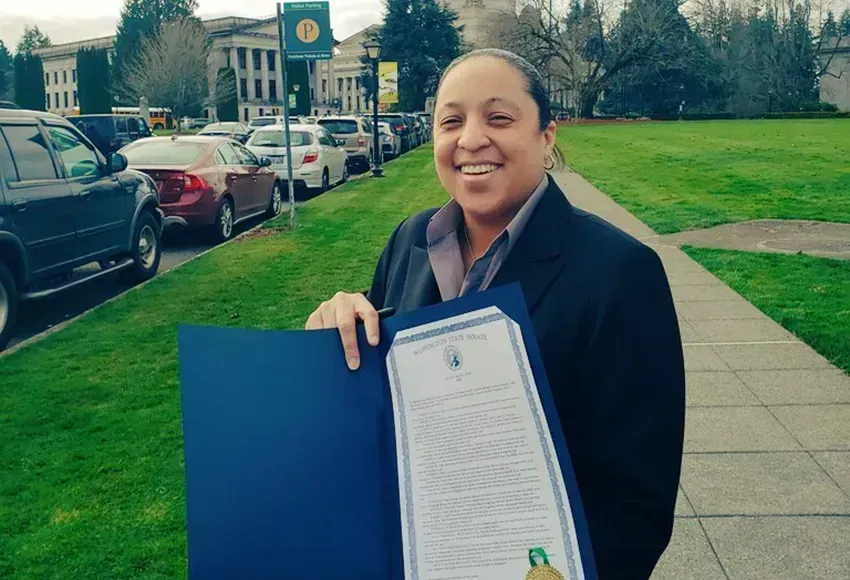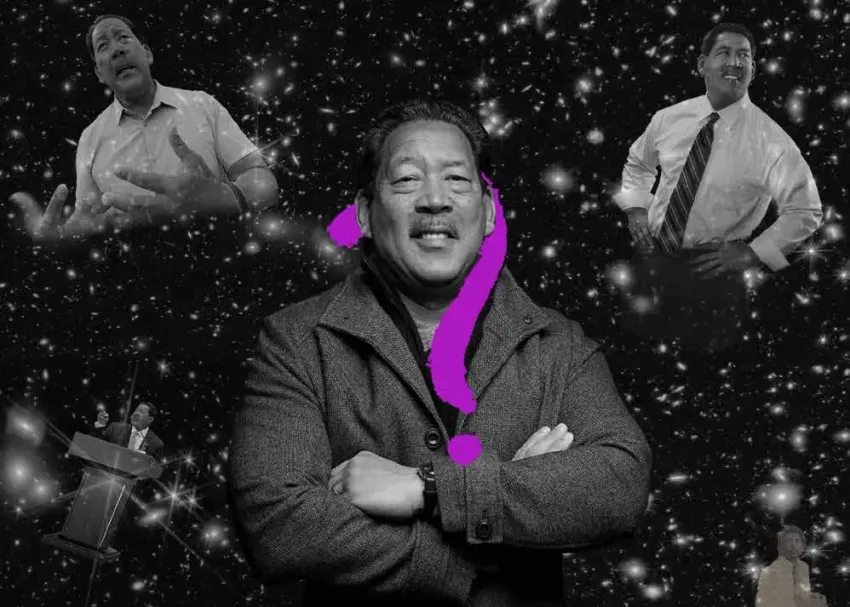Bruce Harrell was irritated when we asked if he was a moderate. Not one of those quiet irritations born of our pet peeves though, like when your friend corrects your grammar or your roommate forgets their weekly chores. No, this felt like it had something to prove.
“When I proposed body cameras because I wanted accountability through the police department, no one supported that. That's progressive thought. When Trump took office, and when Roe v. Wade discussions started to erupt, I said, ‘Let's change the welcoming city status to include women seeking reproductive health care.’ That's progressive thought!” Harrell proclaimed.
“So when you say, ‘He's a centrist,’ I'm about as radical as you could get! If you go to the Black community and say, ‘Who's the most radical politician that's been in Seattle's history?’ they'll say, ‘Bruce Harrell.’ So when they say this ‘centrist’ stuff, without even being general, I'll say, ‘Who says that?’ I know who says that.”
The “who” could represent a wide swath of voices across his career, whether national media, community activists, or politicians who challenge his incumbency. Yet the frustration comes from a desire to be known by a different label: public servant — the blue-collar ideal of the elected official who puts in the hard work and in return earns the trust and respect of the people.
“My mom and dad worked for the City of Seattle. They were public servants,” said Harrell. “I tell people on the city council: you don't make a lot of money. I took a huge drop in pay, but I really wanted to be a public servant. Just to solve problems and to fight for underrepresented people. I've been around a lot of bigots in my day, and I told myself: if I'm ever in a position of power, I'd always lead with love, faith and hope.”
Yet after 12 years of service, Harrell’s work has not been simply defined by love, faith, and hope. Something went wrong, somewhere along the way, and now he has been a witness to the deterioration of trust in our political institutions. Whenever an outcry is directed at the SPD, Parks & Rec, or the City Council, he regularly takes on the work of damage control, often at the expense of his own reputation among progressives.
If there is a world where he could be seen as the “public servant” anymore, that would require a consensus on how Harrell thinks through his decisions. Not just his public-facing self, who tries to be everything to everyone, but the self that exists behind closed doors. Does he hide his true intentions to prioritize business interests, as his opponents suggest, or is he just a genuine idealist whose positivity got swept up in an increasingly cynical world?
Schrödinger's experiment suggests that a cat, inside a closed box, is simultaneously alive and dead while it is unseen. In order for its state to be defined, the box must be open. Bruce Harrell, in the court of public opinion, is both duplicitous and honest. He’s both moderate and progressive. It’s time we open the box and settle who Harrell truly is.

Seen as a unifier
From the very beginning, Harrell was playing the game of mayor with a bad hand. The office he inherited from Jenny Durkan had just been sued for trying to conceal her text messages from the press. She had overseen the chaotic, two-week period of CHOP/CHAZ, when officers harmed protesters, businesses were vandalized, and Durkan’s attempts to please both sides ultimately pleased nobody. Trust in the mayor’s office had been damaged by compounding crises. City Hall needed someone who they felt could heal their wounds.
When the Seattle Times first endorsed Harrell for mayor, it described him as a potential unifier. It saw his past experience as a city council president — who notched progressive victories on implementing body cameras and preventing job discrimination against former inmates — as the fix for a dysfunctional relationship between a “far-left” city council and a “more moderate” mayor’s office.
“To set this right, Harrell’s proven consensus-building ability isn’t just a comfort,” wrote the editorial board. “It’s a necessity.”
To make their case, moderates at the time pointed to Harrell’s “Compassionate Seattle” plan. He wanted to put forward a ballot initiative to address the homelessness crisis. It would have funded substance use treatment, provided more funding to social services, and expedited emergency housing.
Moderates saw the initiative as an opportunity to bridge the gap between themselves and progressives. Progressive groups refused the olive branch. Instead, they said that Compassionate Seattle, despite its name, was an attempt to fundamentally change the city charter, so sweeps would become the default response when addressing encampments.
The truth’s more complicated. The initiative’s text would have encouraged the city to “avoid dispersing people” but also said this could be ignored if “particular problems” arose. It also said that the whole initiative could be “liberally construed to achieve its purposes.” In other words, a world with Compassionate Seattle on the books wouldn’t have forced any mayor to use sweeps but could have been weaponized to justify them.
The initiative never passed, but Harrell ultimately didn’t need justification. He’s swept over 5,000 encampments across his first term. He wanted to look like he was using a scalpel, yet his actions were those of a hammer.
Four years later, the mayor’s words still feel like they’re disconnected from his actions. That’s not to say he doesn’t want to make our city better in good, honest ways. He’s established and expanding the Community Assisted Response & Engagement (CARE) Department. He established permanent paid sick leave for gig workers, and put higher standards for carbon emissions on the books.
However, are we instead more likely to remember his attempt to build a playground in Denny Blaine Park, or the toxic infighting of the City Council he built in his image? How can Harrell truly intend to be a “public servant” yet court controversy at every turn?

Monisha Harrell
Monisha Harrell had long felt supported by her uncle, who helped raise her. They celebrated the holidays together, Pride included. Bruce Harrell never shamed his niece for her identity as an out Lesbian and LGBTQIA+ rights advocate. When her policy work at Equal Rights Washington resulted in protecting Queer Seattleites from conversion therapy, he rewarded her with an opportunity: to serve as his campaign manager. When he won in 2021, Harrell promoted her to deputy senior mayor.
In another world, with Ms. Harrell’s track record, the Harrells could have done a lot of great work for the Queer community together. Yet as the years went on, Ms. Harrell’s relationship with her uncle soured, and she quietly left his administration in 2023. For a long while, it was just another one of those moments when something went wrong along the way.
That was, until this year, when we got some honest answers.
In a conversation with KUOW, Ms. Harrell revealed that she saw the Harrell administration as a “dog-eat-dog environment,” where unspoken sexism and racism influenced decision-making. It was a bombshell that divided the women around City Hall, three of whom publicly sided with the mayor, six others anonymously siding with Ms. Harrell.
While it’s easy to get lost in the salacious details, such as Mayor Harrell calling Ms. Harrell an “SDM [senior deputy mayor] Nazi”, the most revealing element of the report was how the administration actually operates on a day-to-day basis. Ms. Harrell, who oversaw the city’s budget department, said that a small group of male colleagues disrupted her ability to work. Rather than address issues they had with her directly, they would instead circumnavigate her and share their concerns with the mayor, who then would overturn her decisions.
According to Ms. Harrell, the mayor surrounded himself with a “cadre of men” whom he often conferred with, often at the expense of female voices across city government. Ms. Harrell said she heard less directly from her uncle as time went on, all while he had discussions about her work behind closed doors.
The mayor had seemingly built an environment where power was regularly, and recklessly, delegated. Rather than trust her perspective on important issues, he would often put Ms. Harrell’s choices up to a vote, in which those with lower seniority had equal say as deputy mayors, without weighing in himself. According to Tammy Morales, his lack of a clear vision meant that deputy mayors took care of more citywide issues, but had to fight tooth and nail to have them prioritized.
Starting over
If Ms. Harrell’s report is based in truth, then it presents Mayor Harrell’s work in a new light. Think about when he had to apologize for the SPD’s crass treatment of Jaahnavi Kandula, or when he had to defend Parks & Rec’s choice to have a hateful religious group at Cal Anderson Park. Think of when he had to place his director of external affairs on administrative leave over a sexual assault case, and had to oppose changes to the ethics code put forth by city councilmembers he endorsed.
So many unnecessary conflicts and scandals have resulted from departments and individuals who are supposed to follow Harrell’s vision. Instead, he has to talk his way out of their mistakes. Would those mistakes have happened if he had more directly informed the decision-making? Or if his deputy mayors were more regularly trusted with their choices, rather than having their work shut down by a group vote?
“Hiring people is one of the most important skill sets that a good mayor should have,” said the mayor, in our recent interview. “The stakes are high. You’re hiring people that will be in charge of hundreds of millions of dollars in budgets. I was a managing partner in a law firm. I was president of the City Council. I’ve had many opportunities to hire people. I went and got certified to be an HR professional, because I realized how serious HR issues are. To put [Katie Wilson] in a place to make these kinds of significant hiring decisions? To start over? I think it’s just a dangerous precedent.”
Support the Seattle Gay News: Celebrate 51 Years with Us!
As the third-oldest LGBTQIA+ newspaper in the United States, the Seattle Gay News (SGN) has been a vital independent source of news and entertainment for Seattle and the Pacific Northwest since 1974.
As we celebrate our 51st year, we need your support to continue our mission.
A monthly contribution will ensure that SGN remains a beacon of truth and a virtual gathering place for community dialogue.
Help us keep printing and providing a platform for LGBTQIA+ voices.
How you can donate!
Using this link: givebutter.com/6lZnDB
Text “SGN” to 53-555
Or Scan the QR code below!



